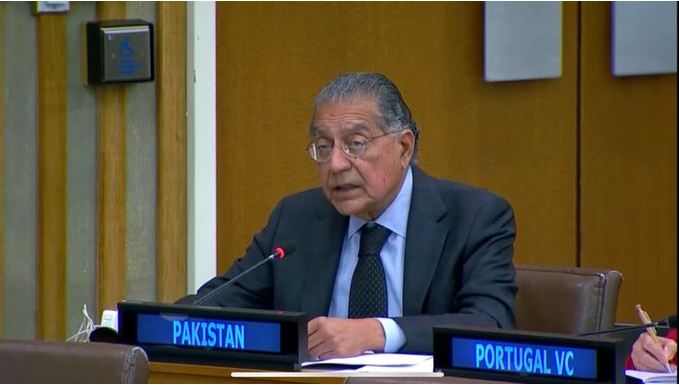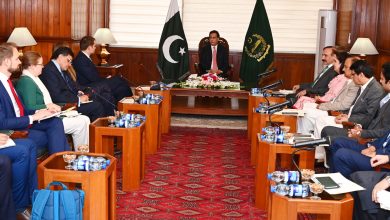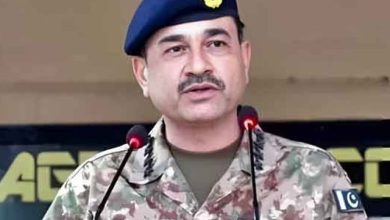Speakers call for addressing women’s plight in occupied territories like Palestine, Kashmir

United Nations: Prominent speakers at a panel discussion, hosted by Pakistan’s Mission to the UN, Monday called for greater global efforts, including uniform implementation of the UN resolutions, treaties and conventions, to end the situations of foreign occupation and conflicts facing women around the world, especially in occupied Jammu and Kashmir and Palestine.
The discussion, a side event, was part of the ongoing 68th Session of the Commission on the Status of Women (CSW68). It took place at UN Headquarters in New York.
Panelists, representing UN-based diplomatic corps, academia, women rights organizations and civil society underlined the challenges and hardships facing the women, girls and children under occupation.
Pakistan’s UN Ambassador Munir Akram opened the discussion in which taking part were Algerian Ambassador Amar Bendjama, OIC Ambassador to the UN Hameed Ajibaiye Opeloyeru, Dr. Dalal Kanaan, Professor at Fordham University, New York, and Dr. Ameena Zia, Professor at CUNY Lehman College & Founder of Blue Ridge Impact Consulting. Mushaal Hussein Mullick, former Special Advisor to the Prime Minister of Pakistan on Human Rights and Women Empowerment, sent a special video message on the occasion.
The panelists demanded that all future UN reports and resolutions of the Security Council on the women, peace and security agenda should include provisions and information relating to the situation of women and girls under foreign occupation. They proposed the creation of a UN monitoring mechanism to register all crimes and violations committed against women and girls under foreign occupation.
They also agreed that mechanisms needed to be established by the UN to ensure accountability for sexual violence and other crimes against women and girls by occupation forces, including an International Criminal Tribunal on accountability for such violations and crimes; also emphasized was that the Secretary-General’s Special Rapporteur on Sexual Violence in Conflict, the UN Action against Sexual Violence in Conflict Network, and the Team of Experts on the Rule of Law and Sexual Violence in Conflict should cover and include reviews and recommendations on the conditions of women in situations of foreign occupation.
The panelists further called for elaboration of international human rights and humanitarian laws and norms to enlarge the ambit of the protection of women under foreign occupation, including an additional Protocol to the Geneva Convention or an appropriate Security Council resolution; Referring to the grave ongoing situation in Gaza, they urged accelerated humanitarian and other efforts to provide relief and assistance, including food, medicines and medical services, to women living under the Israeli occupation. In his remarks, Ambassador Munir Akram emphasized the urgent need to address the extreme and disproportionate suffering of women and girls in situations of foreign occupation and intervention, a topic that he believes has been overlooked in global efforts to promote and protect women’s rights.
Highlighting the observations of Security Council resolution 1325, Ambassador Akram underscored the profound impact of war, conflict, and violence on women and girls under foreign occupation. He outlined a range of violations, including sexual attacks, arrest, denial of essential resources, intrusion of privacy, and the destruction of homes—a form of collective punishment. Drawing attention to specific regions, Ambassador Akram pointed to the decades-long suffering of women in Palestine and Jammu and Kashmir. He highlighted the brutal conditions endured by Palestinian women under Israeli occupation since the Nakba of 1948 and the grave human rights violations against Kashmiri women since the 1989 Kashmir Intifada. Notably, he cited the horrific gang-rape incident in the villages of Kunan and Poshpora in 1991, documented in reports by the High Commissioner for Human Rights. Ambassador Bendjama, the Algerian permanent representative, threw light on the heroic struggle of Algerian women in the freedom struggle. He described them as role models of courage and sacrifice and said that they exemplified the spirit of revolution. He said the world couldn’t ignore the plight of Palestinian women as they faced the worst Israeli brutality and called for the global efforts to address gravest women rights abuses in Occupied Palestinian Territories, especially in Gaza. OIC’s Ambassador Hameed Ajibaiye Opeloyeru said that the United Nations was having two major crises on its hands in terms of foreign occupation in South Asia and the Middle East.
He highlighted the various forms of exploitation and persecution suffered by the women and young girls in situations of foreign occupation and explained how the colonial-settler apparatus endeavored to undermine the women-led structures. He urged the UN Security Council to ensure cessation of genocidal war in Gaza and implement its resolutions vis-à-vis Jammu and Kashmir. Ms. Mushaal Mullick shared the heart-rending Kashmiri women’s stories of deep anguish, pain and immense suffering. She said that the women, girls and children were the worst sufferers in the conflict situation as was evidenced by the plight of Palestinian and Kashmiri women, who were being subjected to rape, gender-based violence, incarcerations and lack of access to education and health. While calling for the implementation of the UNSC resolutions, humanitarian law, and international law, Mushaal Mullick demanded the establishment of judicial mechanisms to hold the violators of women’s rights accountable. She also called for the implementation of the recommendations of the UN Secretary General given in his report. Professor Ameena Zia gave an overview of women rights movements and said that better coordination, utilization of stakeholder approach, inclusion of women and gender-based perspectives in all areas of policy and implementation were critical and couldn’t continue to be sidelined in policy spaces. She said that the disproportionate effects of conflict on women manifest in many ways as mentioned and the properties must be aligned in securing humanitarian and peace and security measures with a lens on political, social, and economic development. Dr. Dalal Kanaan, Palestinian-American Professor at Fordham University, shared the real-life experiences of the Palestinian women facing the prolonged situation of the brutal Israeli occupation. Expressing her solidarity with the Kashmiri women, she recounted the daily struggles of the brave Palestinian girls and women to survive the apartheid regime in poignant details.








